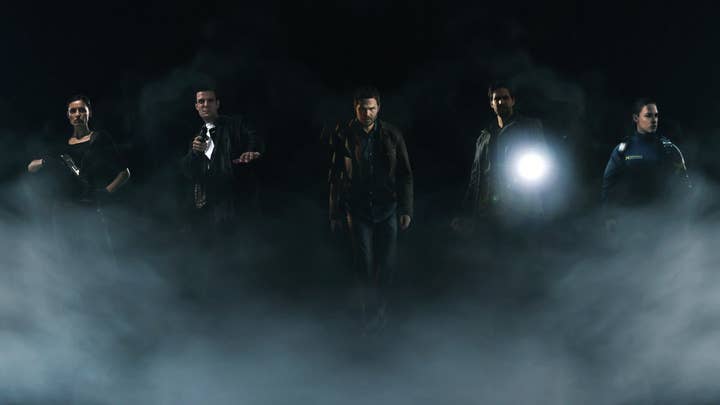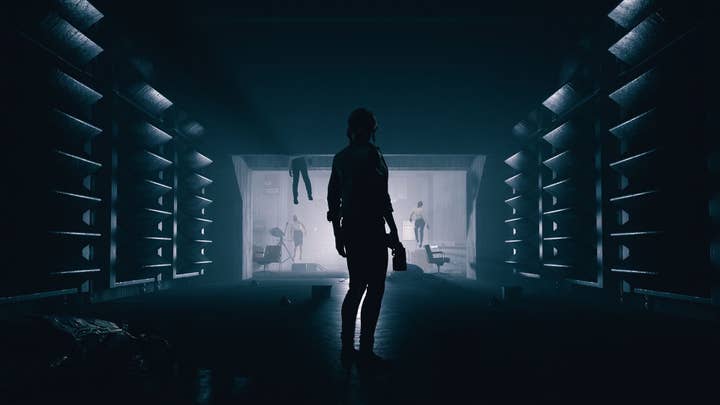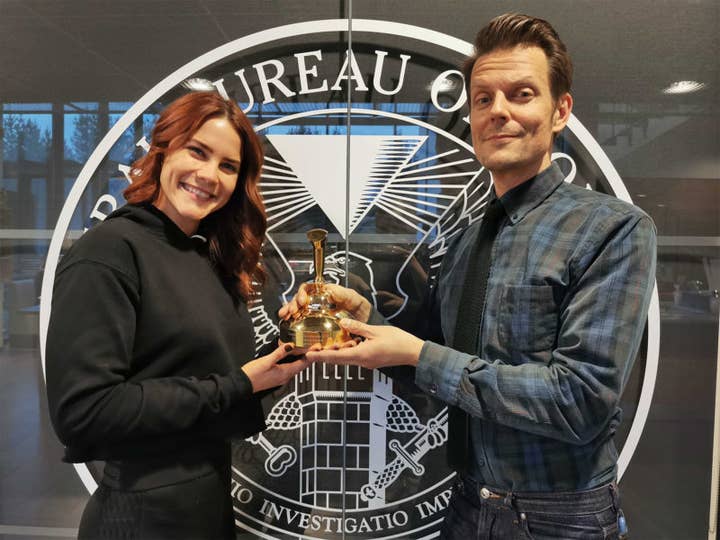People of the Year 2019: Remedy Entertainment
The Finnish studio's bid for independence was about building a more stable future -- Control proved it was also about creating the best possible games
In April 2016, Remedy Entertainment launched Quantum Break, a product that embodied certain qualities that most people would see as definitive of its creator. Quantum Break was only available on Xbox and PC, just as Remedy's preceding game Alan Wake had been. Quantum Break had taken five years to make; Alan Wake took the best part of seven.
Both games displayed Remedy's unique voice -- that heady blend of high style, detailed world-building and metatextual flourish -- but they also offered a glimpse at the practical challenges it obviously faced. Remedy was known as one of the industry's leading developers of narrative-driven games. It was also making games for a limited audience due to its reliance on Microsoft, and for taking a very long time to make those games.
Fast forward one year and pretty much all of that had changed. In a striking display of self-awareness, the Finnish company sought to address those very problems by raising money through an IPO. It inked a deal to work on the sequel to Smilegate's CrossFire, one of the most successful free-to-play games in existence. And, to the excitement of many, it announced plans to once again release games on PlayStation hardware, almost 15 years after the launch of Max Payne 2.
"We changed the culture of production and development. We haven't done a game as fast since Max Payne 2"
Mikael Kasurinen
Speaking to GamesIndustry.biz at the time, CEO Tero Virtala explained that Remedy was taking the first steps towards being in full command of its own destiny -- a luxury it didn't have when it created Alan Wake and Quantum Break.
"There is still this thinking that we want to be more in control of the type of games we make," he said. "We want to have a stronger say... We always focused on creating one game, and one of our specialities is the way we build the game worlds; the role of the locations, the characters and the stories in the worlds where we then place our games.
"If we make an excellent game -- and that's a massive investment -- we would like to preserve the possibility that we can then continue those stories in future games as well. With Alan Wake and Quantum Break, that didn't work."
Working faster and smarter, with better technology, and control over the IPs it creates. These may seem like obvious goals for a game developer, but that doesn't diminish the courage it takes to cut ties with more than a decade of your existence and rely on the courage of your convictions. Plenty of companies have dwindled and died rather than take that bold a step, and this year brought the first signs of Remedy's future: Control, which shares its name with the very thing its creators wanted to achieve by making it, and is unquestionably one of the best games released in 2019.

"We're extremely proud of Control, not just from the perspective of quality and creativity, but also in how we changed the culture of production and development," Mikael Kasurinen, the game's director, tells GamesIndustry.biz. "We haven't done a game as fast since Max Payne 2.
"What makes it even more impressive is that Control involves a lot of new technology, a new approach to the world structure, and is also not a sequel -- a rarity nowadays. We also wanted to put the player in charge of the experience and rely less on linear storytelling or heavy cinematics. The world itself is the stage for the stories we want to tell -- inspiring exploration and discovery, taking cues from RPGs and open world games.
"Control puts a degree of faith in its players that is all too rare in games made with millions and millions of dollars."
"I think it is crucial for us to be open-minded, and purposefully look for new approaches and ideas, yet we need to hold on to our uniqueness. This balancing act is a continuous process that allows us to evolve and get better at what we do. To me, Control is definitely a successful demonstration of that mindset and attitude."
While Control is a departure from the linear structure of Alan Wake and Max Payne, it is still unmistakably a Remedy game. Indeed, in the Oldest House, the game's constantly shifting, morphing environment, it may have taken its celebrated talent for setting and atmosphere to new heights. Control is the studio's most gleefully strange and unsettling work to date, obliterating any notion that it might play it safe now that the money on the line was almost entirely its own.
Remedy drops the player into a deeply weird universe of redacted information and shifting realities, providing just enough lore for you to grasp how bonkers the situation is, but not nearly enough to explain away the fun. Control puts a degree of faith in its players that is all too rare in games made with millions and millions of dollars.

"Being original makes it easier to differentiate your game -- which is important, but at the same time consumers also like familiarity," says Thomas Puha, Remedy's communications director. "Ironically, in Control, the things that the game got praised for were in some ways also things which kept some consumers on the fence. I think we could have done a better job at messaging what the game was about, but seeing just how much positive sentiment and discussion there still is around the game months after release is pretty amazing."
As Puha points out, launching a new IP late in the console cycle is difficult even with the kind of first-party resources that a company like Microsoft could bring to bear. With Digital Bros subsidiary 505 Games as a partner, Remedy set itself a stern challenge by returning to the world of independence with a game that can be challenging to describe even to an interested friend -- let alone a potential customer with $50 to spend in a wealth of other options.
"There is a lot of Control on my calendar in 2020"
Thomas Puha
The fact that it did so, however, is to be admired, and Control has received no shortage of admiration since its launch in August. This is not the kind of game to receive wall-to-wall perfect scores from a games press that occasionally treats art like grab-bags of features and bang-for-buck value, but it is exactly the kind of game that will place near the top of Best of 2019 lists -- even from those who wouldn't stretch beyond a seven or eight in an official review.
That much was clear when Control picked up the Critics Choice award at this year's Golden Joysticks. Remedy's game was nominated in eight categories overall, one more than it is contention for at The Game Awards next week -- including Game of the Year. According to Puha, this sustained interest is "humbling, to say the least," and it is convincing more and more players to take a chance on the game.
"Awards and nominations help not just in creating buzz, but in boosting brand awareness and establishing the Control IP," Puha adds. "There is a lot of Control on my calendar in 2020. We are here to stay and support the game with our publisher 505 Games, which is what the plan has always been."

Control's standing as a creative work is beyond question, but when Remedy set out to reinvent the way it made games in 2016, it was done as much in the name of stability as artistic freedom. The fact that we never got an Alan Wake 2 was not Remedy's decision -- more on that soon, we hope -- and it saw the power to make those choices as absolutely central to a brighter future for its business. A game like Control will always be a gamble, of course, but Remedy now has more influence on exactly how long it can wait for that gamble to pay off.
"In our industry, new games come every now and then, but very few break through and become something special"
Tero Virtala
"Control was developed in three years with a budget of less than €30 million," says Remedy CEO Tero Virtala. "We don't quite require the same huge lifetime numbers as many other games with bigger development budgets. Therefore, even though Control didn't have chart-topping sales right from the get go, we are in a good position with steady sales. We always take the long view here.
"Nowadays, the majority of sales for many games are generated over a long period of time in digital stores -- and Control continues to sell, which is good. We are bringing more free and paid content to the game. It has the proven high-quality and uniqueness, and the word-of-mouth that keeps growing. There is still a big audience out there that hasn't yet heard of Control. These are all factors that support the longer-term sales.
"Strategically, it has been highly important that we have succeeded in establishing a new brand. In our industry, this is very challenging: new games come every now and then, but very few break through and become something special. It is of course still very early days, but Control is showing good signs of establishing itself and having a growing fan base."
While Remedy is clear that new and old fans can expect more from Control in the near future, Virtala adds that it shouldn't be seen as the end of the journey that started three years ago. The company now employs more than 250 people from 30 different countries, and it has not sacrificed its emphasis on employee happiness to reach those numbers. Control was made to a tighter schedule than its two previous games, with a (relatively) smaller budget, all while improving the underlying technology, which will help the various ideas being incubated at the company to be made even more quickly and efficiently.
"That's a big win for us internally," says Virtala. "As a company, we also think beyond individual games to build long-term success -- that is done step by step, in a sustainable way. I'd say we have taken the first steps, but there is still a lot to be done, and we keep on improving.
"But we believe we are on the right trajectory and in a strong position to make decisions. It's a good position to be in."









